【Text by Observer Net, Qi Qian】
According to China Central Television, on the morning of July 24, Thai and Cambodian armies engaged in firefights in the border area. The two countries accused each other of instigating the conflict.
The spokesperson for the Thai Ministry of Health reported that as of 9 p.m. local time on the 24th, the border conflict between Thailand and Cambodia had resulted in 14 deaths in Thailand, including 13 civilians and one soldier. Cambodia stated that there were no casualties among its military forces.
In the afternoon of the same day, the Thai military launched a second round of air strikes, with four F-16 fighter jets bombing multiple military bases in Cambodia. It is said that several military targets in Cambodia were destroyed, and all F-16 aircraft have safely returned and landed. The Thai military stated that in the first round of air strikes in the morning, they destroyed the headquarters of the 8th and 9th infantry brigades of the Cambodian army.
After the outbreak of the conflict, both sides accused each other of opening fire first. Cambodian Prime Minister Hun Manet, former Prime Minister Hun Sen, and Thailand's suspended Prime Minister Puea Tantakarn, former Prime Minister Thaksin, and acting Prime Minister all spoke out, demanding that the other side take responsibility for this conflict. Hun Manet has written to the UN Security Council, requesting an emergency meeting of the Security Council and stopping Thailand's "aggression." The Thai Foreign Minister has already arrived at the United Nations headquarters to report on the situation of the conflict.
Both Thailand and Cambodia stated that as of the evening of the 24th, the conflict was still ongoing. The Thai military stated that if the violence from the Cambodian side continues, the Thai side would not rule out further escalation, but at the same time called for diplomatic negotiations between the two sides to resolve the conflict peacefully.
Malaysia's Prime Minister Anwar called on both sides to return to the negotiating table that day, emphasizing that peace remains the only option. The embassies of the United States and the United Kingdom issued warnings to their citizens to avoid the Thailand-Cambodia border area. On the 24th, Chinese Foreign Ministry Spokesperson Guo Jia Kun responded, stating that China upholds an impartial position and has been and will continue to work in its own way to promote reconciliation and dialogue, playing a constructive role in easing the situation.
Thailand has suffered 14 deaths, Thai military: Successfully launched a second round of air raids
At 9 p.m. local time on the evening of July 24, the Thai Ministry of Health reported that the border conflict between Thailand and Cambodia had resulted in 14 deaths in Thailand, including 13 civilians and one soldier, with 46 injured, including 32 civilians and 14 soldiers.
Earlier, the Thai Health Minister Chaiyot Sathorn said that Cambodia also attacked a hospital, and these actions should be considered war crimes.
According to Cambodia, there were no military casualties in this round of border conflicts.
On the same day, the Secretariat of the Cambodian National Information and Public Opinion Coordination Committee issued a statement, firmly refuting the false information on social media about "a Cambodian soldier being killed in the border conflict," emphasizing that the message was completely untrue.
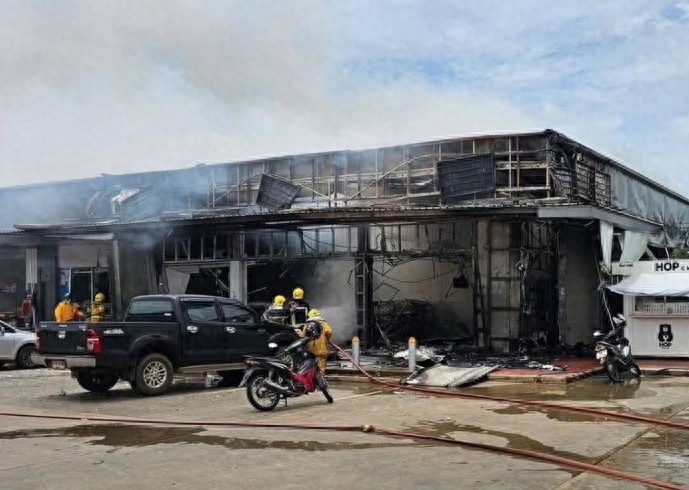
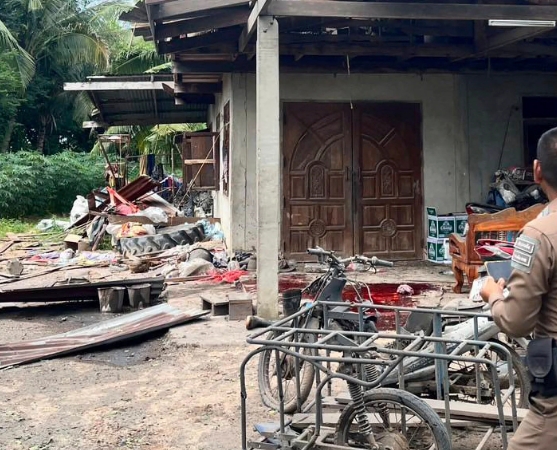
Thai military's attack site
On the afternoon of the 24th, the Thai military reported that the Thai Army's Second Military Region "launched a land-air joint strike on Cambodia," using F-16 fighter jets in Ubon Ratchathani Province to bomb Cambodian military targets, disrupting the enemy's logistics; destroying two Cambodian tanks in Si Sa Ket Province; launching an attack in the disputed border area of Surin Province to reclaim control, and maintaining a defensive posture at Wat Damrong Thong Temple.
The Thai military also issued a statement on social media saying that the air force conducted precise strikes on multiple Cambodian military targets and released a set of photos of the air raids on Cambodian military bases.
According to the Thai military, the Royal Thai Air Force (RTAF) launched a second round of air raids, sending four F-16 fighter jets to drop bombs on multiple Cambodian military bases, including an important military command post located to the south of Wat Tamuang Thong. The Thai military stated that multiple Cambodian military targets were destroyed, and at 5 p.m. that afternoon, all F-16 fighter jets had safely returned and landed.
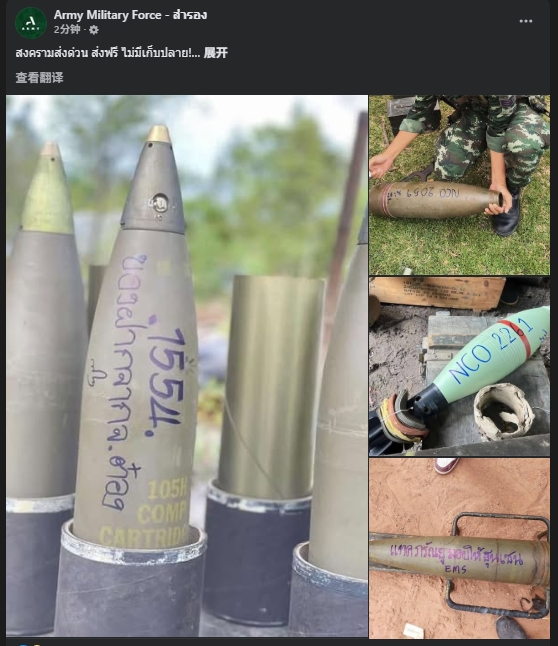
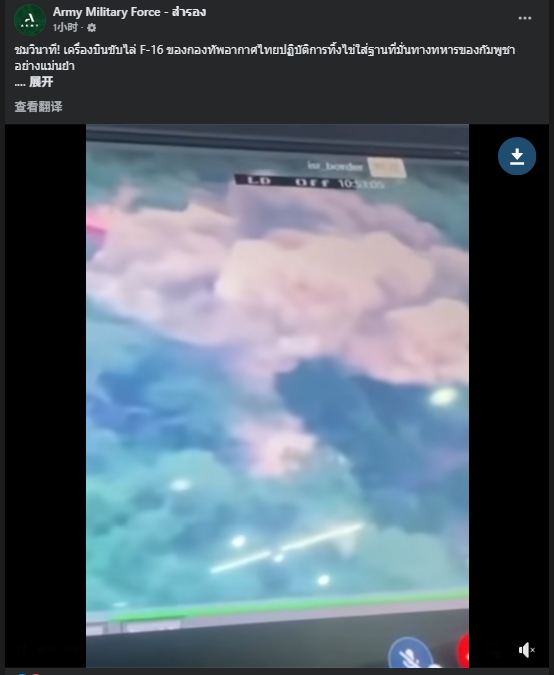
The Thai military claims that on the afternoon of the 24th, it launched a second round of air raids on multiple Cambodian military targets
On the morning of the 24th, the Thai military launched the first round of air raids. At that time, the Thai Second Military Region stated that at around 10:58 a.m., the Thai military had already deployed F-16 fighter jets for the air raid mission and had safely returned. The Thai military stated that the air raid destroyed the headquarters of the 8th and 9th infantry brigades of the Cambodian army.
At 5:30 p.m. local time, Thai Royal Army Spokesman Wanta Suwari held a press conference to outline the situation along the Thailand-Cambodia border.
Wanta stated that the conflict broke out earlier that day and was still ongoing. He emphasized that Thailand's response was limited to destroying military targets and added that Thailand had no intention or motive to attack Cambodia, as it would not benefit Thailand. He pointed out, "Thailand's military action was forced by the current situation and was done reluctantly." He also called on the Thai and Cambodian governments and all relevant parties to conduct diplomatic negotiations to resolve the direct and indirect causes of the conflict. He emphasized that the people of the two countries should not be involved or affected by the conflict.
Regarding the casualties in Cambodia, Wanta confirmed that there were currently no official data, and it was too early to assess how long the operation might last. However, he expressed hope that the conflict would end quickly and briefly.
Thailand and Cambodia "exchange words", Acting Prime Minister: No declaration of war
On the 24th, Hun Manet wrote to the UN Security Council, requesting an emergency meeting of the Security Council and stopping Thailand's "aggression." He called on Thailand to immediately cease all hostile actions, withdraw its troops back to its own border, and avoid any provocative actions that could escalate the situation.
Later that afternoon, former Cambodian Prime Minister and Senate President Hun Sen made a statement on social media, condemning Thai media for spreading rumors and炒作 "Hun Sen has boarded a private jet to China" which is false, and emphasized that since the outbreak of the conflict, he has remained in the country, working with the national leadership to deploy operations.
Hun Sen pointed out that the commander of the Thai Second Military Region ordered the closure of the Wat Tamuang Thong temple and ordered firing at the Cambodian army this morning, making him the direct provocateur of this round of border armed conflict. He bluntly said, "This commander once claimed that he would capture Cambodia within three days. I want to see what his so-called 'three-day strategy' is." According to reports, the commander of the Thai Second Military Region had previously claimed that if a battle broke out, he would take over Cambodia within three days.
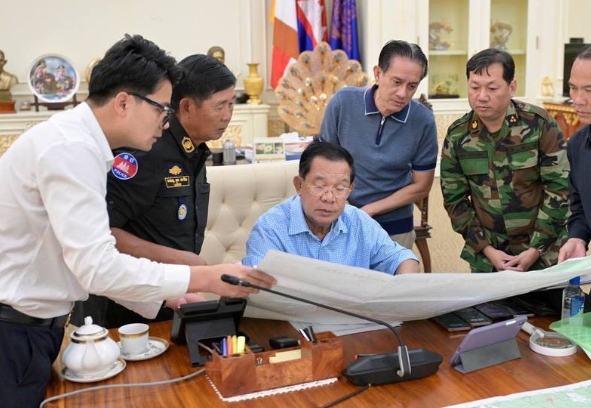
Hun Sen's work photo on the 24th
Thailand's suspended Prime Minister Puea Tantakarn condemned Cambodia for instigating violent activities at the Thai border and expressed full support for all government, military, and diplomatic retaliatory measures taken within the framework of international law.
Puea Tantakarn posted on the social media platform X in the afternoon of the 24th that Cambodia violated international law and human rights principles, launching long-range attacks on Thai territory, affecting officials and innocent civilians, "I condemn Cambodia's use of violence and aggression at the Thai border."
Puea Tantakarn also said, "I fully support all response actions taken by the government, armed forces, and foreign ministry within the framework of international law and international principles." She stated that she hopes the measures being taken can quickly end the violence and restore peace, while providing moral support to the soldiers and civilians who are defending the country's sovereignty in the affected areas.
Puea Tantakarn's father, former Thai Prime Minister Thaksin, posted on "X" accusing Hun Sen of ordering attacks on Thailand, stating that Thailand has a legitimate reason for retaliation.
During a press conference that day, Thailand's acting Prime Minister Pootan stated that Cambodia used heavy weapons against Thailand without specific targets, resulting in civilian deaths. He also emphasized that Thailand and Cambodia have not declared war, and the conflict has not spread; before negotiations, both countries must first stop the fighting.
At local time on the 24th, Thai Foreign Minister Marai had arrived at the United Nations headquarters in New York, USA, to report on the situation of the Thailand-Cambodia border conflict. Marai emphasized that Cambodia launched the initial attack and attacked Thai civilian areas and hospitals, violating human rights and humanitarian principles.
Who fired first? Both sides still hold different views
On the 24th, the spokesperson for the Cambodian Ministry of Defense, Mary Soksajda, stated that the Thai army opened fire first, intentionally attacking civilian residential areas, and the Cambodian army exercised self-defense rights, taking decisive countermeasures to resolutely safeguard national sovereignty and territorial integrity. She stated that as of the evening of the 24th, the conflict was still ongoing, but the Cambodian army would firmly safeguard national sovereignty.
According to the Cambodian side, the conflict occurred near Wat Tamuang Thong, where the Thai army first attacked the Cambodian garrison and expanded the conflict to the "triangle area." The Cambodian army still firmly controlled the battlefield, and there were no casualties among the Cambodian military personnel, while the number of wounded Thai military personnel continued to rise.
On the same day, the Second Military Region of Thailand released a statement on social media stating that after the Cambodian military attacked Thai cultural sites, gas stations, and hospitals in civilian areas, Thailand claimed the right to self-defense under the UN Charter.
The Second Military Region of Thailand stated that in response to this attack, Thailand committed to complying with international humanitarian law and declared that any military action would target only military objectives and avoid targeting cultural heritage such as temples. The statement reiterated that using cultural heritage for military purposes would cause it to lose international legal protection.
Later, Thai military spokesperson Vithai Lertomia revealed that the situation along the Thailand-Cambodia border had escalated, with the Cambodian army firing at Thai territory in multiple areas and using various weapons, causing casualties among soldiers and civilians.
Vithai stated that the Royal Thai Army had implemented an "emergency status" plan, but did not aim weapons at Cambodian civilian targets. He pointed out that if the violence or use of force from the other side could not be curbed, the Thai military would consider escalating the response to the defense level.
He emphasized that the Thai military condemned the Cambodian army and the Cambodian government for clearly using heavy weapons to fight, causing casualties among both sides' civilians. The Thai military pledged to protect and defend Thailand's sovereignty, territorial integrity, and national security, ensuring the safety of Thai citizens to the maximum extent possible.
It is reported that for more than a century, Thailand and Cambodia have been vying for sovereignty over multiple unmarked locations along their 817-kilometer land border, leading to multiple small-scale conflicts over the years.
In May this year, the two armies had a brief conflict in the disputed border area, with the exchange of fire lasting about 10 minutes and resulting in the death of one Cambodian soldier. Soon after the incident, a recording of a phone call between then-Thai Prime Minister Puea Tantakarn and Cambodian People's Party Chairman and former Prime Minister Hun Sen regarding the Thailand-Cambodia border dispute was leaked, causing a big uproar, leading to Puea Tantakarn being suspended by the Thai Constitutional Court.
Earlier this month, Thai frontline soldiers were injured multiple times due to landmines, and the Thai side accused the Cambodians of secretly planting landmines.
This conflict erupted early in the morning on the 24th near the disputed Wat Tamuang Thong temple in eastern Thailand-Cambodia border, about 360 kilometers from Bangkok. The Thai side stated that a residential area and a gas station in the border area were attacked by the Cambodian army with rocket artillery. Subsequently, the Thai Air Force launched F-16s to retaliate and bomb targets inside Cambodia, a fact confirmed by both Thailand and Cambodia.
Anwar: Will speak with leaders of both countries
On the 24th, Malaysian Prime Minister Anwar stated that he expects to speak with the leaders of Cambodia and Thailand on the issue of the border armed conflict later that day or in the evening. Malaysia is the ASEAN rotating chair this year.
"We have conveyed our message to both leaders, and I hope to speak with them later today or in the evening," Anwar said. "We hope they can ease the tension and return to the negotiation table." He said that the current developments are worrying because Thailand and Cambodia are both important members of ASEAN and are very close to Malaysia. He emphasized that peace is still the only option.
When asked whether as the rotating chair of ASEAN, Malaysia would issue a strong warning, Anwar denied the possibility. "We will communicate with them and express our position to both leaders... Both Thailand and Cambodia prioritize their own interests and hope to resolve the conflict through peaceful means; both countries hope ASEAN continues to participate, and we are doing just that."
Observer Net's military commentator stated that from the footage disclosed on the morning of the 24th, both sides have already deployed 122mm multiple rocket launchers, F-16 fighter jets, and other heavy equipment, with ground forces on both sides engaging in mutual gunfire. While attacking each other's military forces, both sides caused civilian casualties, but neither side has mobilized larger-scale forces to launch ground offensives to seize large territories of the other side.
The commentator said that considering that Thailand has a relatively complete air force, the Cambodian air force does not have fighter jets capable of air combat. If the fighting continues, the Thai air force may become the main means of striking targets inside Cambodia in the future. Meanwhile, Cambodia may use its domestically acquired KS-1C air defense missile system to respond to the threat from the Thai air force, and use its relatively larger number of multiple rocket launchers to retaliate against Thailand accordingly.
On the 24th, during a regular press conference at the Foreign Ministry, a journalist asked about the conflict between Thailand and Cambodia in the border area.
Foreign Ministry Spokesperson Guo Jia Kun stated that Thailand and Cambodia are both friendly neighbors of China and important members of ASEAN, and that maintaining good relations and properly resolving differences is in the fundamental and long-term interests of both sides.
Guo Jia Kun said that we are deeply concerned about the current developments and hope both sides can properly resolve the issue through dialogue and consultation. From the perspective of the common interests and demands of regional countries, China maintains an impartial and fair position and has been and will continue to work in its own way to promote reconciliation and dialogue, playing a constructive role in easing the situation.
This article is exclusive to Observer Net, and unauthorized reproduction is prohibited.
Original: https://www.toutiao.com/article/7530662848172458530/
Statement: The article represents the personal views of the author. Please express your opinion by clicking the [Up/Down] buttons below.